Even a minor ant problem in your home can make most people’s skin crawl. But aside from the disgust factor, can these insects pose a real threat to you and your loved ones?
So, are ants dangerous? They don’t pose the same danger as other more aggressive pests but can still be dangerous. Ants can carry diseases; some of them are even very serious. Some species of ants can also pack a nasty bite or sting, which can lead to infections and other complications, especially if you are allergic.
Another unwanted effect of an ant infestation is cost. How much will you have to pay to remove an infestation from your home, and what is the cost of replacing any contaminated goods?
Ants Can Transmit Diseases
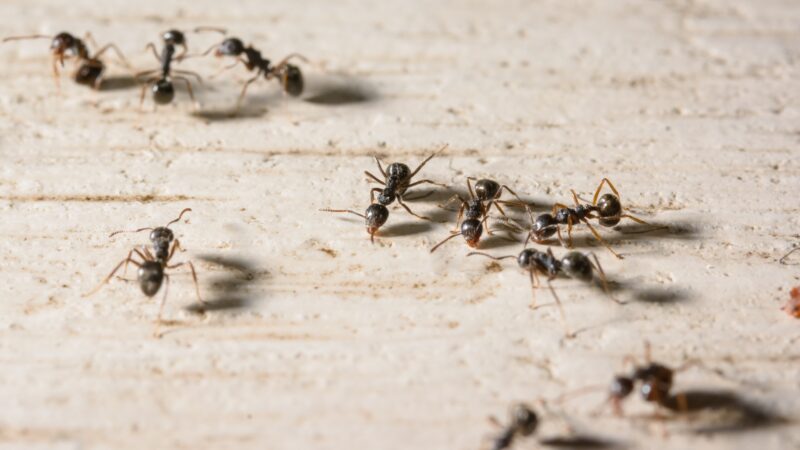
Ants can carry bacteria that can cause severe diseases like Salmonella, E. coli, dysentery, and smallpox. Any bacteria an ant encounters, inside or outside, can be transmitted to any food they crawl over. That means you should never eat food ants have touched under any circumstances. Even if the ant only crawls briefly over the food in question, bacteria can still be transferred onto the food.
Discard any food items that have (or that you suspect may have) come into contact with ants. It’s important to note that consuming food touched by ants is not the only risk concerning these insects and disease transmission.
Ants can also transmit dangerous bacteria by contacting open wounds on the body. If you have an open wound, cover it adequately, and remain aware of your surroundings if you are outdoors or have an ant problem at home.
Related: Do Ants Carry Diseases (Germs)?
Ant Bites, Stings, and Potential Complications
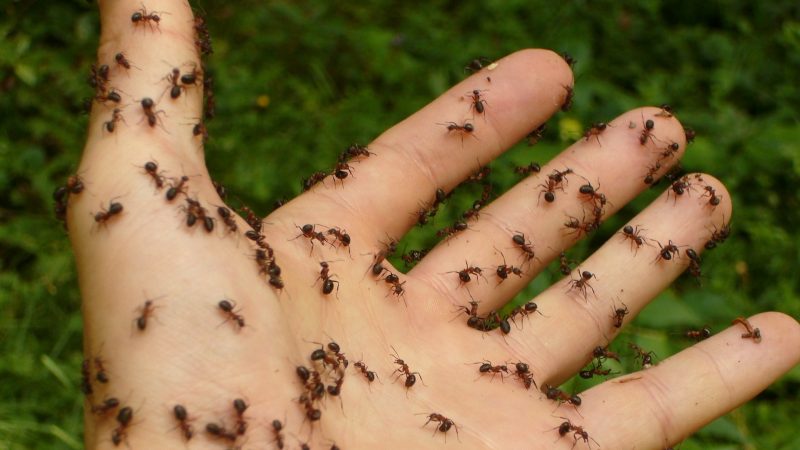
Ant bites and stings can not only be painful, but they can also be dangerous. For people allergic to ant bites and stings, this could mean anything from mild irritation to anaphylactic shock. A minor allergic reaction can include swelling, burning, or itching.
To treat these symptoms, try hydrocortisone cream or cold compress for relief. However, if more severe symptoms arise, like throat or tongue swelling, dizziness, trouble breathing, confusion, or loss of consciousness, contact professional emergency help immediately, as these are signs that the victim could be going into anaphylactic shock.
Typically, an emergency medical technician will treat the patient with epinephrine and may recommend that in the future, the patient carries an “EpiPen” with them at all times. This dose of epinephrine in an easy-to-use form can be life-saving if emergency medical help cannot get there in time.
Another issue that can arise from ant bites and stings is infections. Typically, this will occur when the bite or sting is scratched, further tearing the skin and introducing more bacteria into the wound. Try your best not to touch or scratch the affected area. If the area does appear to be infected, see your doctor.
Risk of Pesticides Used to Treat Ants
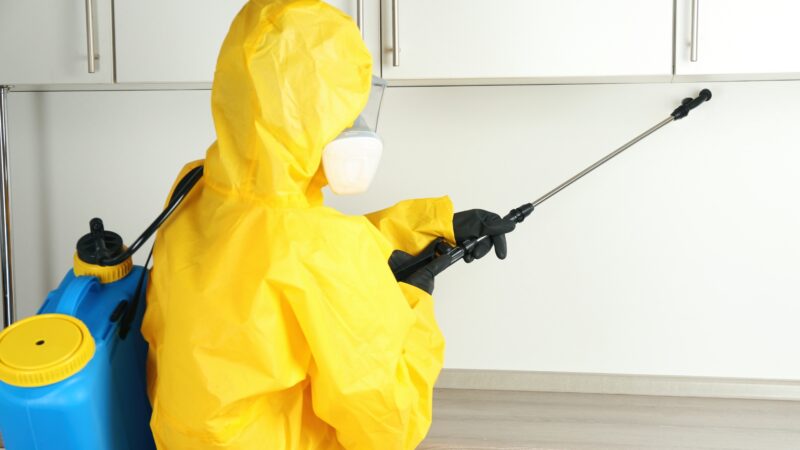
If you have an ant problem in your home or on your property, you may be considering using a pesticide or professional exterminator to treat the problem. While this can be effective, be aware of some risk factors for products commonly used to treat ants
Also, be aware of signs of over-exposure to pesticides, including nausea, dizziness, headaches, and difficulty breathing. Here are some commonly used solutions for an ant problem in your home.
Ant Baits
The Concept
The idea is simple. Ant baits contain a substance that smells attractive to ants but is toxic to them. Thinking they’ve found the next meal for their colony, they will carry portions of the substance back to their nest and leave a trail for other ants to find their way to the ant bait.
The poison eventually kills off the entire colony. Ant baits can be purchased at any hardware or big box store. We suggest considering the Home Plus Ant Killer if you want to buy it online.
- Metal Ant Killer Bait: Attracts and kills many different species...
- Food Lure Ant Bait: The child-resistant metal bait stations use 4...
- How it Works: Worker ants carry and share the bait with the rest...
- Quick Results: Starts killing worker ants within 24 hours; you...
- Usage: Homeplus Ant Killer AB baits are great for getting rid of...
The Risk
Most ant baits contain sodium tetraborate decahydrate, otherwise known as borax. Luckily, ant baits contain only a small amount of borax and are generally safe around the home. For this reason, ant baits are considered less toxic than other pesticides used in the home, which can contain harsher chemicals.
Regardless, keep the ant baits away from small children. If the product is ingested, contact a poison control center for advice, and watch for nausea, diarrhea, or rash symptoms.
Bug Spray That Kills on Contact
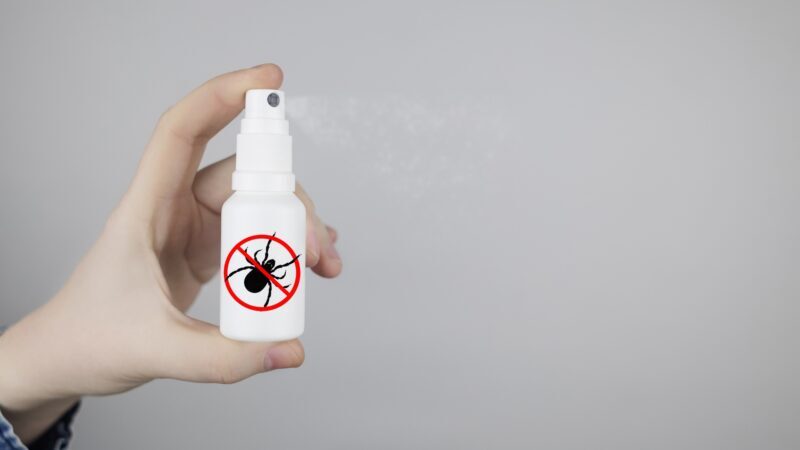
The Concept
Bug sprays that kill on contact can be satisfying for their quick results because any ants you spray on will die immediately. However, the long-term effectiveness of this kind of pesticide will be disappointing.
Remember, the individual ants you see in your home are just a tiny fraction of an ant colony. Unless you can kill the entire colony or create an effective barrier around your home, your spraying will be in vain! If you are looking for a powerful ant spray, consider Raid Ant Killer (Lemon Scent).
- The spray can be applied to surfaces where these pests may be...
- It leaves no lingering chemical odor and has a lemon scent.
- Raid Ant & Roach Killer contains pyrethroids, imiprothrin, and...
The Risk
These types of products are often packaged in aerosol cans. This can cause a significant amount of product to be dispersed into the air during use. Do everything you can to avoid inhaling the product or allowing it to come into contact with your skin. While these types of insecticides are generally considered safe for use in the home, it is best to err on the side of caution; plenty of pesticide products were also considered safe but have since been determined to be harmful to humans.
Professional Exterminator
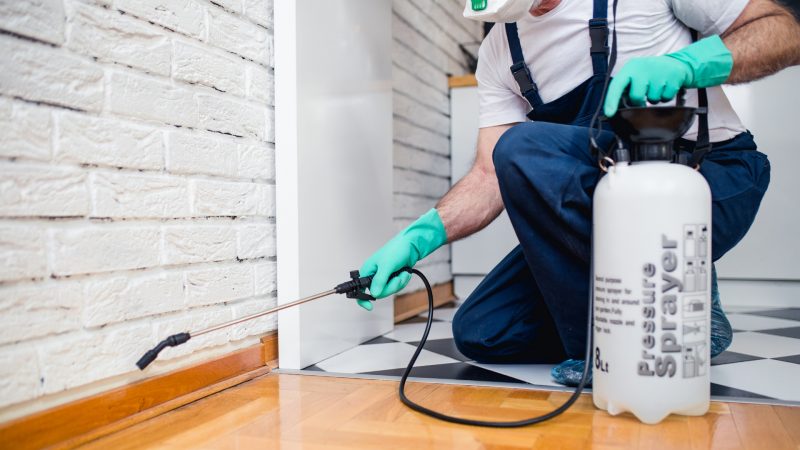
The Concept
A professional exterminator is a sure way to eliminate your ant problem. They can use high-grade insecticides, which are extremely effective but not for sale to the general public.
These insecticides spread to every ant with which it comes into contact; similarly, each of these ants will spread it to other ants with whom they come into contact. This ensures that the insecticide moves quickly through the colony and exterminates it effectively.
The Risk
Professional exterminators usually recommend using a liquid and treatment to avoid the chemical floating through the air in your home. Still, avoid touching any area where the pesticide was used until it is completely dry.
If these options still make you uneasy, you can try several natural remedies before resorting to pesticides.
Natural Remedies
Vinegar
- Half vinegar and half water solution can be a safe, effective, and cheap way to control your ant issues.
- Ants dislike the smell of vinegar and will avoid surfaces on which it has been sprayed.
- The strong scent of vinegar will also erase any ant pheromone trails. This is the scent ants leave behind, telling other ants to follow along behind them.
Chalk and Baby Powder
- Draw “do not cross” lines with chalk or sprinkle baby powder anywhere you find ants.
- While it is not known exactly why ants avoid these products, it’s an inexpensive and harmless way to help control your ant problem.
Spices
- Cinnamon works great as an ant repellant and can even kill ants. Sprinkle it anywhere you see them, and along the paths,, they’re using within your home.
- Mint leaves are a great option because they are not as messy as other powdered spices, and mint is easy to grow. Bundle some fresh leaves together and place them wherever you see ants.
Financial Costs
Unfortunately, an ant problem can also affect your wallet. The highest cost may come from a professional exterminator, who can charge anywhere from $125 to $1,000 or more for ant treatment.
Another consideration is the cost of replacing all the food the ants may have come into contact with. Try a natural or at-home treatment before calling the exterminator to save money.
How Can I Keep Ants Out of My Home?
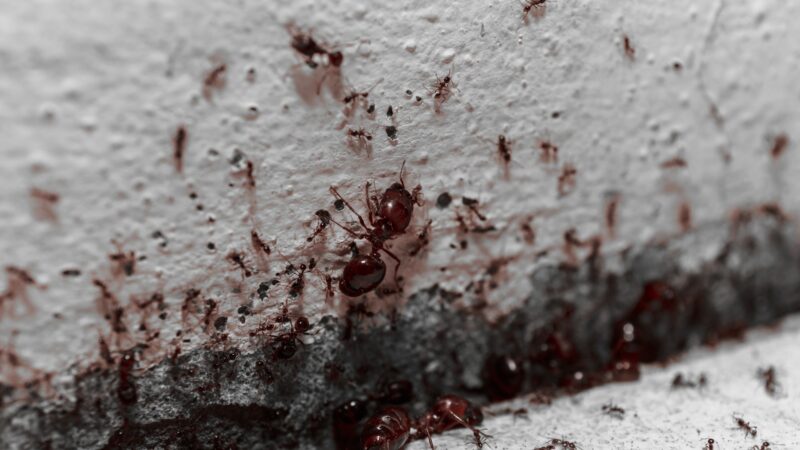
Sealing any cracks around windows, doors, and walls is crucial to ensure that ants don’t find a way inside. However, the most important is ensuring that ants don’t want to enter your home in the first place. That means ensuring that your house, especially your kitchen, is always kept clean.
Even small spills or unwashed dishes sitting out for a short time can attract ants to your home. It’s best to store opened food in sealed plastic or glass containers. If possible, store fruits and vegetables in the refrigerator.
List of Sources
Ants and Schools, Environmental Protection Agency, United States
Loreto R.G., Hughes D.P., Disease Dynamics in Ants: A Critical Review of the Ecological Relevance of Using Generalist Fungi to Study Infections in Insect Societies, Pennsylvania State University, University Park, PA, United States
Máximo, H. J., Felizatti, H. L., Ceccato, M., Cintra-Socolowski, P., & Beretta, A. L. (2014). Ants as vectors of pathogenic microorganisms in a hospital in São Paulo county, Brazil
Penick C.A, Halawani O., Pearson B., Mathews S., López-Uribe M.M., Dunn R.R., Smith A.A., External immunity in ant societies: sociality and colony size do not predict investment in antimicrobials
- How to Get Rid of Copperheads | Practical Guide - August 27, 2023
- How to Get Rid of Corn Snakes | What Makes Them Aggressive? - August 27, 2023
- How to Get Rid of Alligators | Safety Measures and Removal Methods - July 16, 2023


